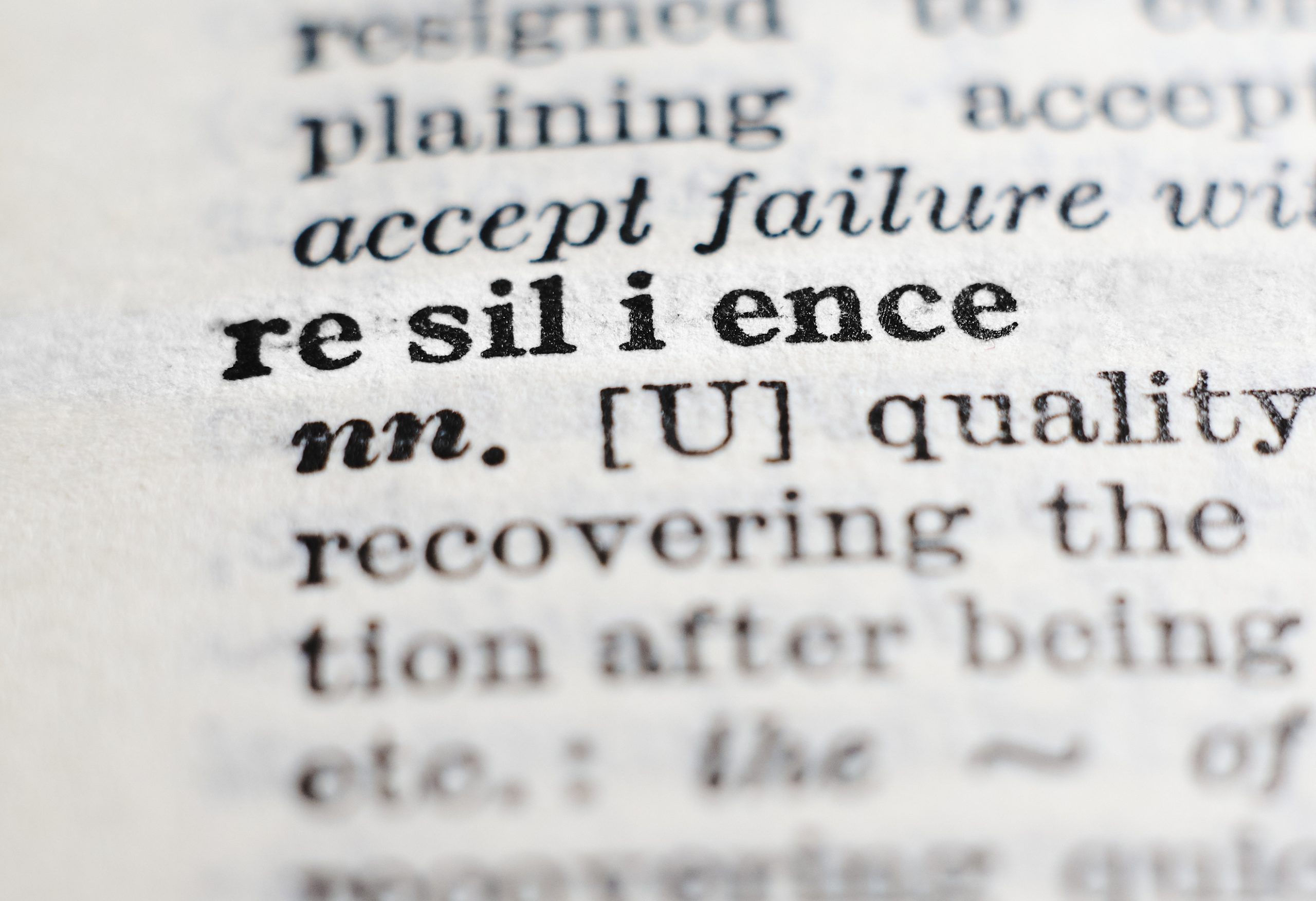It’s the so-called “magic ingredient” that makes Olympians, West Point grads, and National Spelling Bee finalists — and it’s become a huge buzzword in high-performance conversations over the past decade: grit.
Together with its co-buzzword resilience, grit has taken on this kind of mythical status — but the truth is, anyone can develop more grit. (Even if you’re not feeling especially gritty or resilient just now.)
Let’s start by talking grit vs. resilience
People tend to talk about grit and resilience together, even though they’re actually distinct concepts — grit is more of a tendency, while resilience is a response that often plays into grit.
Leading grit researcher and GLP podcast guest Angela Duckworth defines grit as,
“A tendency that fuels sustained action in the face of relentless adversity over an extended period of time that leads to extraordinary achievement and outcomes … it’s a combination of long-term passion and long-term perseverance — emphasis on long-term.” (As in, years and decades.)

It’s important to clock that word tendency. Nobody is in a grit mindset all the time, but people who do have a high degree of grit are in that state more often than not throughout their lives.
Resilience, on the other hand, is “The maintenance or quick recovery of mental health during and after exposure to significant stressors.” (Nature Human Behavior)
It’s important to note that resilience isn’t just acceptance, or endurance — it’s an active, creative response:
“Resilience is not simply inertia, or insensitivity to stressors, or merely a passive response to adversity, but the result of active, dynamic adaptation.” (Nature Human Behavior)
This makes it a key component of grit, making it possible for people to keep going towards whatever their big goal is even in the face of setbacks and challenges. Without resilience, no matter how much passion or willpower someone has, they’re eventually going to get worn down.
The best part? Neither grit or resilience is a fixed trait. People do tend to be born higher or lower on the grit and resilience spectrum by luck of the draw, but building grit and resilience is absolutely possible.
How to develop resilience and grit:
Understand the close connection between grit and growth mindset.
Angela Duckworth talks a lot about reframing your ideas of success, which ties right into having a growth mindset — aka believing that you can learn and develop, instead of believing that you’re stuck with the cards you were dealt as-is. To develop grit, you need to start seeing success not as some end point that you eventually get to, but rather the road that takes you towards your goals, and what you’re able to learn along the way.
“Shifting people’s focus of a metaphor (i.e., focusing on the journey vs. the destination part of a completed path) can lead to consequentially different perceptions and behaviors … [this] facilitates the continuation of behaviors that are aligned with the completed goal.” Journey of Personality and Social Psychology
While that might sound a little counterintuitive — after all, how can you work towards a goal when you don’t really have an end point? — it’s actually incredibly helpful, because it means that whatever happens along the way is all part of your learning. You may reach certain milestones, but if you commit to developing your grit with a growth mindset, you’ll find that it becomes enjoyable to try to constantly one-up yourself.
Bringing in the learning component also takes a lot of the “do or die” feeling out of what you’re working on, which is really important for keeping your motivation up. If you’re able to reframe your failures as learning opportunities, all the sudden they don’t feel quite as devastating.
This also ties into resilience, as researchers have found that optimism and humor are key traits in resilient people.
“Optimism, herein defined as the expectation for good outcomes, has been consistently associated with the employment of active coping strategies, subjective well-being, physical health, and larger and more fulfilling social networks and connections.” Frontiers in Behavioral Neuroscience

Get clear on your “Northstar goal”.
A lot of people think about grit and resilience as having the ability to push through tough times to get to where you want to go. But the truth is, it’s more about having a strong sense of purpose to pull you towards your ultimate goal. When you view challenges or setbacks in light of that all-important goal, they start feeling much smaller — sometimes almost irrelevant — in light of your bigger commitments. It’s about “aligning with that which you most deeply care about.” (Angela Duckworth)
What’s more, having a Northstar goal keeps you focused on the task at hand, making it incredibly easy to decide where you want to spend your time and energy. If doing something gets you closer to that goal, then it’s a yes. Anything else is a no.
Finally, if you happen to be able to tie your Northstar goal into a sense of morality, or some internal belief system of guiding values along with your sense of purpose, it’ll be even stronger, and also help with resilience.
“The existence of a moral compass or an internal belief system guiding values and ethics is commonly shared among resilient individuals. Similarly, purpose in life was a key factor linked to resilience in a study of 259 primary care patients with a history of exposure to a range of severe traumatic events.” (Frontiers in Behavioral Neuroscience).
Practice mindfulness and cognitive reappraisal
Mindfulness might be the single most important skill you can develop in your life — it helps you remain grounded in the midst of high emotions, as well as helps you cultivate a better sense of objectivity about yourself and the world around you, which is key for making responsive decisions about what you want to do in any given moment, rather than just reacting.
In terms of grit and resilience, practicing mindfulness is essential. It helps you keep your head in the game when the unexpected happens, and even tones your nervous system, keeping you calm and focused.
Plus, one of the key elements of mindfulness — thought dropping — ties right in with one of the key elements of resilience, cognitive reappraisal. Cognitive reappraisal is the practice of noticing when you’re having a negative thought, dropping that thought, and actively replacing it with a positive thought. This helps “people build their personal well-being resources, ranging from physical resources, to intellectual resources, and social resources.” (American Psychologist Journal)
Add in structure and support.
A grit mindset doesn’t just happen out of nowhere — you need both structure and support to help it come into being. While most of us won’t have the same level of structure in our days that, say, Olympic hopefuls do, it’s still important to build some kind of routine into your grit and resilience work. Context matters when it comes to developing grit, and structure can make your work into a habit, helping you keep going even when you don’t feel like it.
Getting support from other people is another important element. Even the most brilliant and talented people in the world are inherently limited to their own capacities because they’re just one person. You need to get outside support in the form of a coach or mentor to help you develop beyond what’s possible on your own. Angela Duckworth says,
“A part of it is about the motivation, but the role of having somebody who, for lack of a better word, is in his possession of a different set of mental models and experiences and the ability to reflect to you what you don’t see and offer a frame that was just not your experience.”
Having community support is also crucial, as it gives you a safe space to be when things are going wrong — in fact, good social support can even mitigate “moderate genetic and environmental vulnerabilities and confer resilience to stress.” (Psychiatry)
This is so important that even just the behavior of trying to get social support is a good indicator for resilience:
“Both the presence of social support and the behavior of seeking social support have been associated with psychological hardiness and flourishing in the face of major adverse life events.” (Frontiers in Behavioral Neuroscience)
Let’s Recap:
— Grit is the combination of long-term passion and long-term perseverance. It’s the tendency that helps people stick with really big, important projects over the long-term, especially in the face of adversity.
— Resilience is a component of grit, and is an active and creative response to stressors that maintains your mental and emotional health. Both grit and resilience can be developed.
— Grit and a growth mindset are closely connected — reframing “success” from a fixed end-point to the journey you take along the way, and your ability to learn something new, is key for developing grit.
— Equally important is a strong sense of purpose. This keeps you going when things get tough, and is especially critical for maintaining resilience. If you can connect with a sense of personal morality, even better.
— Mindfulness is also incredibly helpful for developing grit and resilience, as it helps you center yourself in the midst of challenges, develops your sense of objectivity, and helps you get better at cognitive reappraisal.
— Nobody builds grit and resilience without support. Bringing in one-to-one support in the form of a mentor or coach is instrumental in helping you develop beyond your own capacities, and community support is a core predictor for resilience.
Resilience and grit are such important areas of development for living a good life — and while we’ve given you some pretty big suggestions, it really all comes down to putting one foot in front of the other, and developing a little more grit and resilience day by day.
Like deep dives into important subjects? We do too! Join the GLP Newsletter family to get the latest research-backed articles on how to live a good life. We craft each email with an intention to connect, and truly enjoy getting to know each and every one of you. Join us here.



